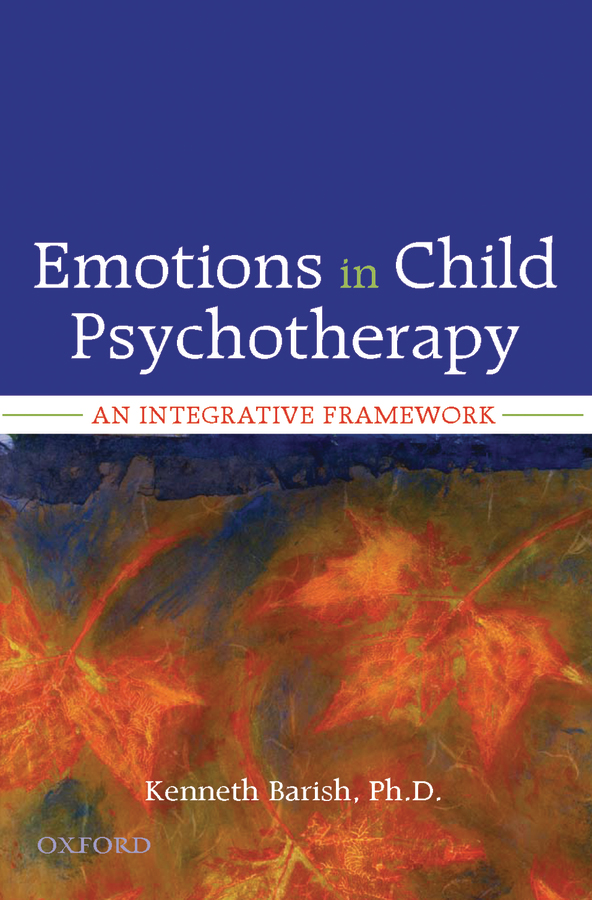Emotions in Child Psychotherapy
 Title: Emotions in Child Psychotherapy: An Integrative Framework
Title: Emotions in Child Psychotherapy: An Integrative FrameworkPublished by: Oxford University Press
Pages: 208
ISBN13: 978-0195366860
Buy the Book: Amazon, Barnes & Noble, IndieBound, Books-A-Million, Amazon
Overview
Emotions in Child Psychotherapy is based on a series of lectures I presented to the faculty and trainees of New York – Presbyterian Hospital, Westchester Division, in 2005.
In this book, I offer an integrative framework for child therapy, based on a contemporary understanding of a child’s emotional experience. I show how a systematic focus on children’s emotions provides new understandings of all phases of the therapeutic process as well as effective ways of solving persistent clinical problems: how to engage more children in treatment, mitigate a child’s resistance, and provide the kind of understanding to children that promotes openness, initiative, and positive character development.
Reviews
"It is refreshing and even inspiring to come across a book like Kenneth Barish's....Barish is remarkable in his ability to draw comfortably from many different intellectual streams simultaneously. While psychoanalysis remains his fountainhead, he is glad to acknowledge the contributions of developmental psychopathology, cognitive behavioral treatment, ethology, cognitive psychology, and neuropsychology...It is heartening to have such an elegantly integrated and optimistic perspective on child psychotherapy available. I heartily recommend it to all trainees, but I especially urge more senior psychotherapists and psychoanalysts to give it their time and attention. I predict that Barish's integrative framework will allow them to see their work—with adults as well as with children—in a new light and that their therapeutic technique will be the better for having read this book."
—Paul M. Brinich, as reviewed in PsycCRITIQUES®
“This book is a gem: practical, wise, and scholarly. Dr. Barish integrates the best of a psycho-dynamically informed perspective with recent, research-based findings from the neurosciences, attachment research, and cognitive-,behavioral as well as systemically informed perspectives. I wish I could have read this book when I was beginning my clinical work.”
—Jonathan Cohen, Ph.D., President, Center for Social and Emotional Education, and co-author of Making Your School Safe: Strategies to Protect Children and Promote Learning
“An insightful, integrative, and clinically sensitive book that will help students and professionals of all major theoretical orientations appreciate the value of emotions and emotion theory in the practice of child psychotherapy. Barish presents a rich theoretical and conceptual framework in which to understand and treat diverse childhood disorders. This book comes at a particularly important time, when empirical support for various treatments is growing dramatically, and when the field is looking for developmentally sensitive interventions that not only incorporate emotion theory but also possess evidence that they actually work. The approach espoused in this book, although not fully tested at this time, will surely help set the stage for thoughtful review and appraisal of such interventions. It is a must read for all serious students of child psychotherapy.”
—Thomas H. Ollendick, Ph.D., University Distinguished Professor and Director, Child Study Center, Virginia Polytechnic Institute and State University
“In this practical, concise and sophisticated new book, Barish provides an integrative approach to child psychotherapy based upon a wonderful synthesis of the latest developments in emotion theory and research, infant developmental research, psychoanalytic theory, and cognitive approaches. By emphasizing the fundamental role played by emotion regulation in both healthy functioning and the therapeutic process, he provides a coherent theoretical framework that illuminates the way in which a range of different therapeutic interventions operate. Conceptualizing play therapy as a vehicle for facilitating emotion regulation and the renegotiation of self-other relationships, Barish provides a theoretically stimulating and clinically rich guide that will be appreciated by clinicians of all orientations.”
—Jeremy D. Safran, Ph.D., Professor and Director of Clinical Psychology, New School for Social Research, and author of Negotiating the Therapeutic Alliance: A Relational Treatment Guide
“Dr. Barish has written an eloquent book for the use of emotions as a central component in psychotherapy with young children and with their families. His main premise, that children develop the capacity to recover or "bounce back" from frustrations and disappointments in childhood, is clearly explained through his presentations of case material. The beginning of the book offers a clear theoretical foundation for his work, emphasizing the variety of emotions humans experience. Each emotion is carefully discussed, with examples from his practice demonstrating how he handled a particular negative emotion of a troubled child, and then how he used the emotion as a stepping stone to open the way for healing. The practical suggestions for parents and for teachers at the end of the book add to the richness of his discourse.”
—Dorothy Singer, Senior Research Associate, Yale Child Study Center, and co-editor of Play = Learning: How Play Motivates and Enhances Children’s Cognitive and Social-Emotional Growth
“Dr. Barish has done the impossible: he's written a practical, engrossing, meticulously documented and researched, authoritative, brief, and innovative book on psychotherapy with children. All clinicians who work with children will love this book, and they will rejoice in how much they learn in so few pages! A triumph!”
—Edward Hallowell, M.D., author of The Childhood Roots of Adult Happiness, Crazy Busy, Delivered from Distraction, and other books
“This is a most impressive, comprehensive, and authoritative contribution towards understanding both the development of emotions in children as well as the child’s lived experience of emotions as ‘signals to ourselves and to others’. Dr. Barish’s perspective focuses considerable attention on reparative experiences ,which he argues become determinative elements in identity formation and character structure. Accordingly, he stresses the crucial but under-appreciated therapeutic value of empathic listening and its role in helping children develop the capacity for age appropriate affect-regulation. This is a must-read book for both experienced and beginning child psychotherapists.”
—Kirkland C. Vaughans, Ph.D., Editor, Journal of Infant, Child, and Adolescent Psychotherapy